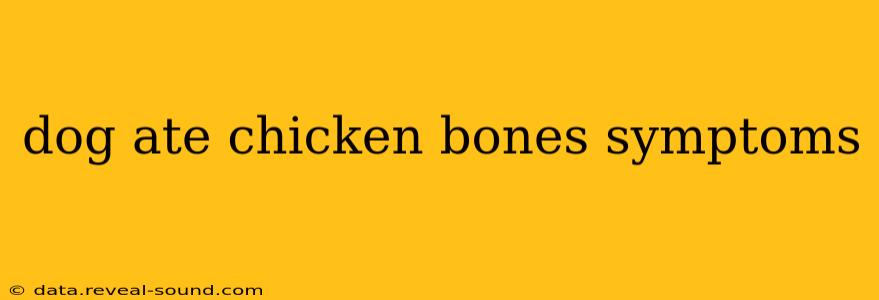Has your dog gotten into a pile of discarded chicken bones? It's a common scenario, and one that can cause significant worry for pet owners. Ingesting chicken bones poses a serious risk to your canine companion, so understanding the potential symptoms, appropriate treatment, and preventative measures is crucial. This comprehensive guide will address all your concerns regarding this potentially dangerous situation.
What Happens When a Dog Eats Chicken Bones?
Chicken bones, unlike the dense bones of larger animals, are brittle and splinter easily. This means that if your dog eats chicken bones, they can:
- Cause Internal Injuries: Sharp bone fragments can puncture or lacerate the mouth, esophagus, stomach, or intestines, leading to internal bleeding, infection, and potentially life-threatening complications.
- Lead to Obstruction: Bones can become lodged in the digestive tract, causing a blockage that prevents food from passing through. This can lead to vomiting, loss of appetite, and severe abdominal pain.
- Cause Choking: Smaller bones can become lodged in the throat, causing immediate respiratory distress and choking.
- Result in Perforation: A particularly sharp bone fragment might perforate (pierce) the digestive tract, resulting in a potentially fatal infection called peritonitis.
What are the Symptoms of a Dog Eating Chicken Bones?
Recognizing the symptoms early is crucial for timely intervention. Here are some signs to watch out for:
Immediate Symptoms (within minutes to hours):
- Choking or gagging: This is a serious emergency requiring immediate veterinary attention.
- Excessive drooling: Indicates discomfort and potential irritation in the mouth or throat.
- Vomiting: This can be blood-tinged if there's internal injury.
Delayed Symptoms (hours to days):
- Loss of appetite: Your dog may refuse food or show decreased interest in eating.
- Lethargy: A significant decrease in energy levels and activity.
- Abdominal pain: Your dog may whimper, cry out, or be reluctant to move.
- Constipation or diarrhea: These can be indicators of digestive problems.
- Vomiting blood: A serious sign of internal bleeding.
- Swollen abdomen: This can indicate a blockage or internal bleeding.
How long does it take for chicken bone symptoms to appear?
The onset of symptoms depends on several factors, including the size and sharpness of the bones, the amount ingested, and your dog's individual digestive system. Symptoms can appear within minutes (choking), hours (vomiting, abdominal pain), or even days later (constipation, lethargy) after ingestion.
What if my dog ate cooked chicken bones?
Cooked chicken bones are even more dangerous than raw bones because they are more brittle and splinter more easily. The risk of internal injury and obstruction is significantly higher.
My dog ate a small chicken bone – should I be worried?
Even a small chicken bone can still cause problems. While it might pass through the digestive system without incident, the risk of injury or obstruction is always present. It's best to monitor your dog closely and contact your vet if you notice any concerning symptoms.
Can a dog pass chicken bones naturally?
Sometimes, smaller, smoother bone fragments can pass through the digestive tract without causing problems. However, this is not guaranteed, and it's always safer to err on the side of caution.
What to Do If Your Dog Eats Chicken Bones
Immediate Actions:
- Assess the situation: Is your dog choking? If so, immediately perform the Heimlich maneuver for dogs (consult a veterinarian or online resources for proper technique) or rush them to the nearest veterinary emergency clinic.
- Contact your veterinarian immediately: Even if your dog seems fine, it's crucial to inform your veterinarian about the incident. They can advise you on the best course of action based on your dog's size, breed, and the amount of bone ingested.
Veterinary Treatment:
Your veterinarian may recommend various treatments, including:
- Observation: For small, seemingly harmless fragments, your vet might monitor your dog for a few days.
- X-rays: To determine the location and number of bone fragments.
- Surgery: In cases of obstruction or perforation, surgery may be necessary to remove the bones.
- Medication: Your vet might prescribe medication to help with pain management, nausea, or infection.
Preventing Your Dog From Eating Chicken Bones
Prevention is always the best approach. Here are some steps you can take to protect your furry friend:
- Proper waste disposal: Dispose of chicken bones and other potentially hazardous food scraps properly, ensuring they are inaccessible to your dog.
- Supervise mealtimes: Keep a close eye on your dog when you’re preparing or eating meals containing bones.
- Teach "leave it" command: Train your dog to leave items alone when commanded.
- Secure trash cans: Use securely sealed trash cans to prevent your dog from getting into the garbage.
By understanding the risks, symptoms, and preventative measures associated with dogs eating chicken bones, you can help ensure the safety and well-being of your beloved companion. Always remember that early intervention is key when dealing with this potential emergency. If you suspect your dog has ingested chicken bones, don't hesitate to contact your veterinarian immediately.
